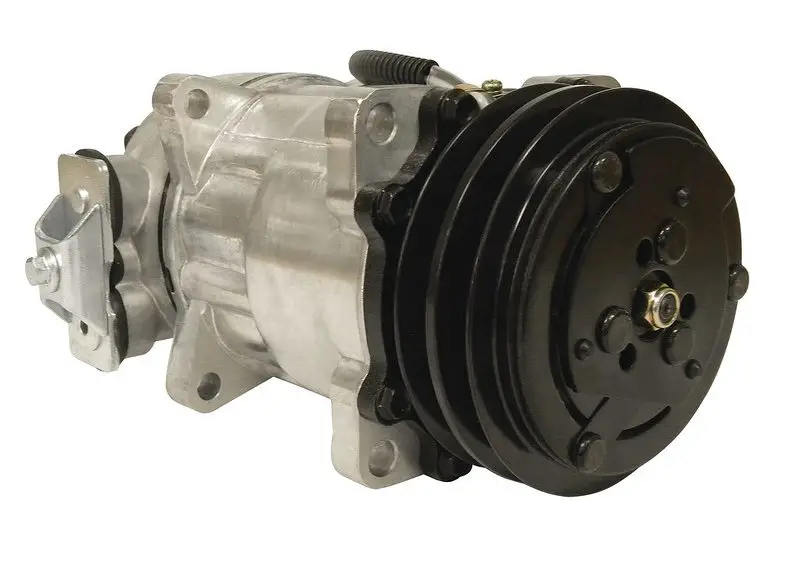AC compressor or clutch? That’s a question you might find yourself asking when your car’s AC starts acting up. Let’s get into the meat of these components, so you’re well-equipped for a smooth and cool ride.

Table of Contents
Understanding the AC System Components
Ever seen an orchestra perform? The conductor, musicians, and their instruments all play their parts harmoniously to deliver a beautiful symphony. Similarly, your car’s AC system is an intricate orchestra, with the AC compressor and clutch playing key roles. Let’s turn the spotlight onto these two instrumental components.
What is an AC Compressor?
Imagine a big heart, tirelessly pumping, driving the life force around a body. That’s what an AC compressor does for your car’s AC system. This vital component compresses the system’s refrigerant, cycling it through the system, and absorbing and removing heat from your car’s cabin. When this heart stops beating, the cool air flow you love so much comes to a standstill.
What is an AC Clutch?
Think of the AC clutch as the conductor of the AC orchestra. It’s the component that decides when the AC compressor, the heart, should start pumping. Acting as a switch between the engine and the compressor, the AC clutch engages when you want cool air, triggering the compressor into action. And when the AC is turned off? It disengages, giving the compressor a well-deserved break.
AC Compressor vs Clutch: The Differences
So, you’re probably wondering, how do the AC compressor and clutch differ apart from their functions? Well, it’s not just about what they do, but also how they’re built and how they interact within the AC system. Let’s break it down.
Functionality
The AC compressor is the workhorse, doing the heavy lifting of compressing the refrigerant and circulating it. The AC clutch, on the other hand, is like the control switch, engaging or disengaging the compressor based on your demand for cool air. They might be two halves of the same whole, but their roles are distinct and indispensable.
Structure and Components
Visually, the AC compressor is usually larger and often seen as a big, bulky unit within the AC system. The clutch, however, is comparatively smaller, residing on the front of the compressor. The differences in their physical structure highlight their unique roles and importance in the AC system.
Interaction Within the AC System
The AC compressor and clutch might be two distinct components, but they interact closely within the AC system. Picture a flawless dance duet – the clutch is the leader, signaling when to engage or disengage, while the compressor follows suit, starting or stopping the cooling process. Their beautiful synchrony is what keeps your rides cool and comfortable.
Check out these other related articles…
AC Compressor Amps: A Guide to Understand Your AC Better
AC Compressor Bypass Belt: Your Comprehensive Guide
AC Compressor O Rings: Your Essential Guide
AC Compressor Without Clutch: A Fresh Take on an Old System
AC Compressor Starts Then Shuts Off: Troubleshooting Guide
Identifying Problems: Is Your AC Compressor or Clutch Bad?
So, how do you tell if your AC compressor or clutch is having a rough day? Much like you or me, they give off signs when they’re unwell. Let’s delve into these tell-tale signs and help you diagnose potential issues early.
Signs of a Bad AC Compressor
A failing AC compressor can make its presence known in several ways. The most evident one – your car’s AC isn’t as cold as it should be, or in extreme cases, not cold at all. But there’s more to it than just a lack of cool air…
AC Compressor Noises
If your car’s AC system is sounding more like a sickly animal than a well-oiled machine, it’s worth paying attention. Strange noises, especially grinding or squealing, can point toward a dying AC compressor. Don’t ignore these noises; they’re essentially distress signals.
Performance Issues
Are you feeling warm air coming out of the vents even when the AC is on full blast? That’s a clear indication of an AC compressor facing issues. It’s akin to your car’s AC losing its cool, quite literally.
Signs of a Bad AC Clutch
While a bad AC clutch can also lead to a less-than-cool car cabin, its symptoms often differ from those of a bad compressor. Let’s learn to identify these signs, so you know when your AC clutch needs attention.
AC Clutch Noises
Strange noises are not just a bad compressor’s forte; a failing AC clutch can also contribute to your car’s AC concert. Listen for unusual clicking sounds when the AC is turned on – these could be warnings from your AC clutch, asking for help.
Engagement Issues
Ever found yourself facing an unresponsive AC system, where the compressor won’t kick in despite the AC being turned on? Your AC clutch might be the culprit, unable to engage the compressor as it should.
Diagnosing a Bad AC Compressor or Clutch
Now that we know the signs, it’s time to play detective and diagnose a bad AC compressor or clutch. Fear not, you don’t need to be a car expert for this – let’s take you through some simple checks you can do yourself.
DIY Checks and Diagnosis
A few simple checks can go a long way in diagnosing potential AC problems. For instance, visually inspect the AC compressor for any visible damage or leaks. Is the AC clutch engaging and disengaging properly? Pay attention to these details, and you might save yourself a trip to the mechanic.
Professional Diagnosis
Despite the best of our efforts, there can be times when it’s wise to consult a professional. When your DIY checks don’t reveal much or when the problem persists despite your best efforts, it’s time to turn to the pros. Remember, there’s no shame in asking for help when you need it!